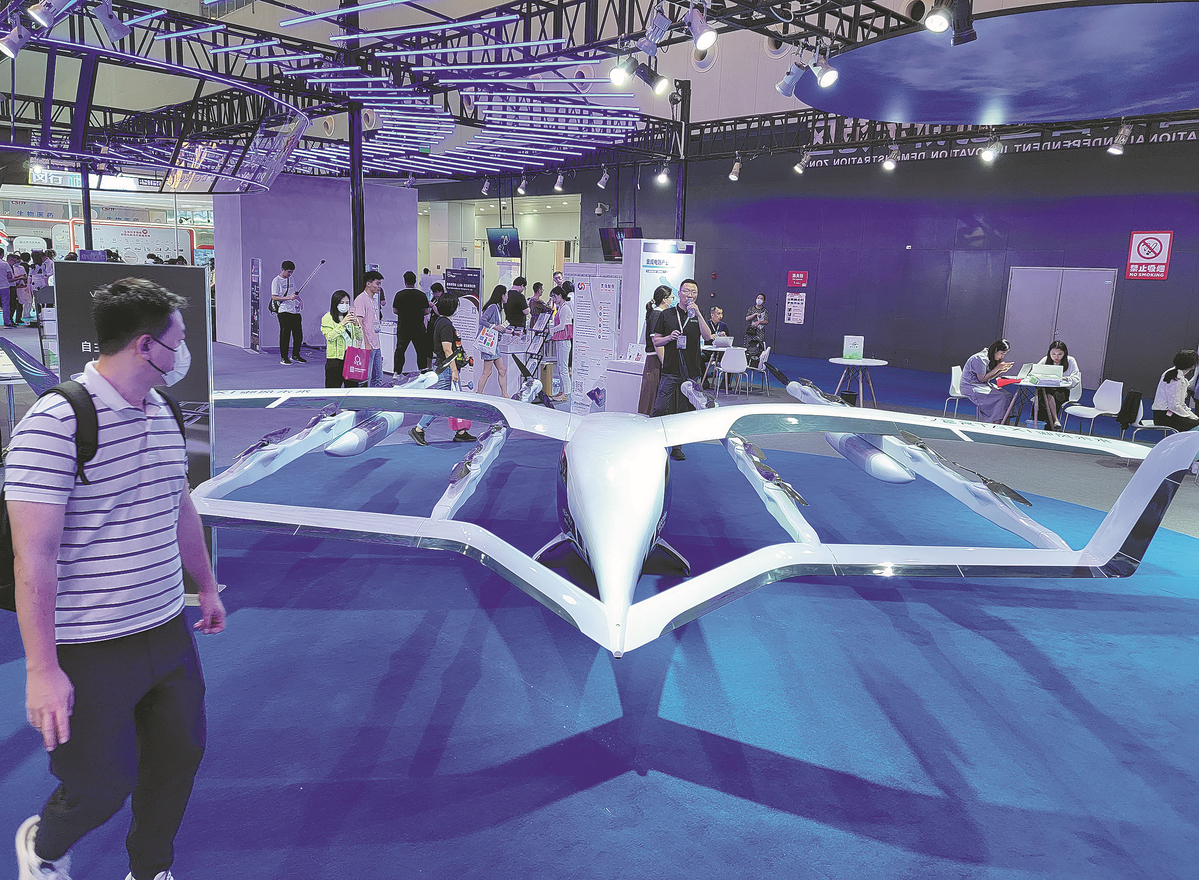
Two Chinese companies specializing in electric vertical takeoff and landing (eVTOL) technologies are standouts at the China (Shanghai) International Technology Fair (CSITF), which is being held from Thursday to Saturday.
Shanghai TCab Technology Co Ltd, an eVTOL firm founded in May 2021, is debuting at this year's CSITF with a miniature model of its independently developed E20 aircraft. The original model will be exhibited to the general public for the first time in Hengdian, Zhejiang province, on Friday, according to the company's brand manager Xu An.
With a maximum payload of 450 kilograms, the E20 model is designed to accommodate one pilot and four passengers. The cruising speed is 260 kilometers per hour while the maximum distance per charge is 200 km, depending on the model's battery capacity.
Often referred to as "air taxis", eVTOL aircraft can take off and land from the tops of buildings, parking garages or helipads in congested cities — similar to helicopters. But eVTOL aircraft are greener as they are powered by batteries. Industry leaders include Archer and Joby Aviation, both of which have gone public on the New York Stock Exchange along with Nasdaq-listed Lilium.
In addition, an eVTOL model developed by China's XPeng obtained a special flight permit in January.
Xu said that traditional helicopters able to accommodate five people cost at least 30 million yuan each ($4.2 million). But each E20 model will be priced no more than 7 million yuan, and operators need not worry about maintenance fees, storage fees or jet fuel costs, which are part of owning conventional airplanes and helicopters.
These cost-saving advantages have helped TCab receive more than 200 orders to date, including an order for 50 E20 models from Asian Express Aviation Group signed in February.
TCab will start from low-altitude tourism as the entry point for its aircraft. It is applying for such a license from the Civil Aviation Administration of China at present, Xu said.
Intercity trips may be provided once technology and related services mature, she added.
In early February, TCab completed a 100-million-yuan pre-A round of financing led by investment fund Grand Flight and followed by Kunlun Capital, Korean Investment Partners, Blue Run Ventures and Decent Capital — the latter two of which are current shareholders of TCab. The company is in talks with different Chinese cities to locate a factory for mass production, said Xu.
Also debuting at the CSITF is Shanghai-based startup Vertaxi. Its first eVTOL prototype Matrix 1 has 16 lift rotors for vertical flight and four propellers for wing-borne cruise flight. While the prototype is now used to deliver items between Jinshan on the outskirts of Shanghai and Zhoushan, Zhejiang province, it is scheduled to make its first manned test flight in the third quarter of this year, said the company's marketing manager Zhuo Hai.
Zhuo said China's leapfrogging progress made in the electric vehicle industry has helped the maturity of the battery industry, which has spurred the development of the eVTOL sector.
In an action plan announced by the Shanghai municipal government in October last year, the city will seek technological breakthroughs in manned eVTOL aircraft and explore new air traffic modalities, which are part of the city's efforts to build industrial clusters for emerging technologies.
As China's first national-level comprehensive exhibition featuring technological demonstrations and trading, CSITF is now in its ninth edition this year. Covering 35,000 square meters, nearly 1,000 companies have signed up for this year's show.

